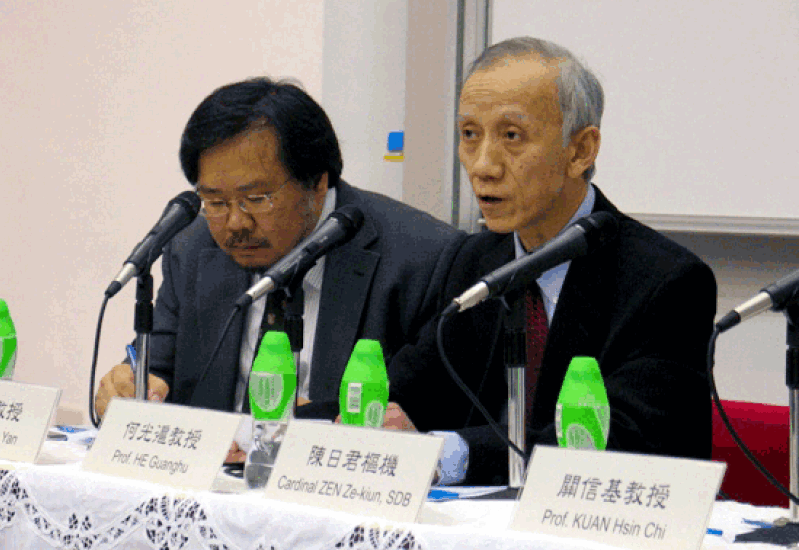
During the 4th Chung Chi College Christian Festival held in late March, Dr. He Guan-hu, professor at Remin University of China, explained the three major misunderstandings that Chinese culture and Chinese people have towards the well-known phrase found in the Sermon on the Mount: “Blessed are the peacemakers.”
“Harmony Precedes All” and “Peacemaker”
Professor He started off by explaining the unique understanding that the Chinese culture and the Chinese people have towards the phrase “peacemaker.” In Chinese culture, it is said that “harmony precedes all”, which may result in only concerned about another’s feelings and not distinguishing the right from wrong.
As Leviticus 19:17 states, “Do not hate your brother in your heart. Rebuke your neighbor frankly so you will not share in his guilt”, Chinese people can only agree with the former part, but find it difficult to implement the latter part, because of the concept that “every household should sweep the snows in front of their doors, why care about the frost on other’s roof tops.”
On the contrary, the “peace” in Christianity is the total opposite from that of Chinese culture. The Bible says to “Flee the evils desires of youth, and pursue righteousness, faith, love and peace, along with those who call on the Lord out of a pure heart” (2 Timothy 2:22), and “Peacemakers who sow in peace raise a harvest of righteousness” (James 3:18). Therefore, peace not only requires the presence of love, but what’s more important is righteousness.
Thus, only the peace that is spoken of in Christianity can break the cycle of hatred and revenge. Looking from a social political level, the absence of justice incites an outcry, as a society without righteousness cannot have true peace. It is necessity to point out the wrongs of the society, group, or individual in order to pursue righteousness.
Blessings and "Blessed"
The second possible ambiguity can be found in the word “blessings.” The Chinese very often interpret “blessings” as harmonious family life, possession of material wealth, fame, stature, health, mate, descendants, and etc., but the “blessed” recorded in Sermon on the Mount is defined as man being the object of God’s blessings – not referring to having any possessions, but simply being in a state of satisfaction and enjoyment.
Professor He then asked, “Where can we find the state of pleasurable joy?”
According to the explanation by Christian humanist scholars, peace is the source of all blessings. If a person is in peace with his heart, with others, and with God, then that is being in the state of joy. Thus, peace-making is being blessed. Therefore, to a Christian, being blessed is not about possessing anything, but it is to be in state of joy that is praised by men and favored by God.
“Son of Heaven” and “Son of God”
The concept of “Son of Heaven” in Chinese culture may cause ambiguity towards the understanding of “Son of God”; the former may confuse one to think that the latter have special rights and is somewhat superior. Professor He said that it is important for both believers and non-believers in China to understand this short phrase.
In Christianity, the phrase “God’s sons and daughters” means being reconciled to God. “Son of God” has no connotation of being any way superior or being a “ruler”, but rather it is defined as “citizen of the heavenly kingdom” and “having eternal life”. Serving in heaven, favored by God, and enjoying eternal life are the core concepts of the Christian gospel.
In conclusion, the Chinese Christian scholar said that the phrase “the peacemakers” does not mean one will be compensated with any materials or worldly possessions, but they will definitely as a result find favor with God, be citizens of heaven, children of God, and possessing eternal life. While the first prerequisite is to have God’s protection and grace, man’s initiatives and diligence is also a necessity, since it is to “produce peace” - this is the real meaning of being a Christian.
During the week-long festival, other high-profile speakers include Cardinal Joseph Zen Ze-kun, former Bishop of Hong Kong Dioesce, and Kuan Hsin-chi, emeritus professor of Department of Government and Public Administration at Chinese University of Hong Kong.
[Editor's note: reporter Luke Leung translated the article.]







